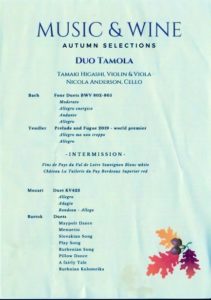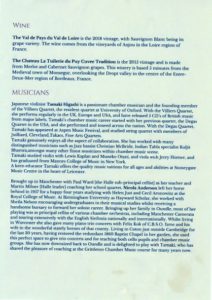

Category Archives: Blog
My Prelude and Fugue in G Minor for Violin and Cello
This work was given its world premiere in All Saints’ Church, Braybrooke, Market Harborough on November 1st 2019.
Here’s a recording of the performance.
VID_20191101_193109 from Ron on Vimeo.
Two new works
Please see Tracks 16 and 17 on the Music Page, two recently composed pieces.
Track 16 is a Prelude and Fugue in G minor for piano.
Track 17 is a “fun” piece written for a school’s flute quartet.
The Myth of Salzburg
In Saltzburg, I sat by the River Salzach, and absorbed the dynamic atmosphere of this city, occupied with tourists following the Mozart trail. Mozart was born here, but moved onto Vienna for greater stimulation. When the railway arrived from Munich, in 1858, eventually going on to Budapest commercialisation of Mozart brought many visitors to the birthplace of this great composer and to visit his father’s house, Leopold.
Whilst researching, I visited the local museum where they call the Mozart
experience a myth as he grew out of Saltzburg and so moved on. Mozart was forgotten about in Saltzburg until the railway arrived!
Please listen to The Myth of Saltzburg composed by me in the music section. I hope you can tune into the flow of the river, the grandeur of the place, the railway and also the influence of Mozart’s music.
Visit to Mittenwald July 2019
Mittenwald is in Germany on the Austrian Border. It is situated in a village overlooked by the Alps.
It became a famous violin-making centre just over 300 years ago when Mathias Klotz set himself up as the local violin maker. His skill was developed by trained violin makers in this area leading to the success of the Mittenwald school of violin makers.
Apart from the very good ice cream shops, the artistic legacy is there for all to see; there are pictures painted on buildings
which reflect the immense amount of artistic creativity centred on violin making.
The Bavarian school of violin makers is linked with all other centres of violin making because of the impact of the Alps. Here, pine grows in the highest areas where the air is very pure, producing a very good quality wood which is characterised by close-growing annual rings ideal for good sound production.
Rime of King William
For those of you interested in making music out of our long-past heritage, consider this!:
He had castles built
and poor men terribly oppressed.
The king was severe
and he took many marks of gold and
hundreds of pounds of silver from his underlings.
All this he took from the people,
and with great injustice
from his subjects,
out of trivial desire.
He had fallen into avarice
and he loved greediness above everything else
He established many deer preserves
and he set up many laws concerning them
such that whoever killed a hart or a hind
should be blinded.
He forbade (hunting of) harts
and also of boars.
He loved the wild deer
as if he were their father.
And he also decreed that the hares
should be allowed to run free.
His great men complained of it,
and his poor men lamented it;
but he was so severe
that he ignored all their needs.
But they had to follow above all else
the king’s will,
if they wanted to live
or hold on to land,
land or property (or esteem)
or have his good favour.
Woe, that any man
should be so proud
as to raise himself up
and reckon himself above all men.
May almighty God show mercy on his soul
and forgive him his sins.
The Mozart Myth in Salzburg
Following a recent visit to Salzburg, I learnt that Mozart was not entirely happy with his musical relationship with this city; he left and went to work in Vienna.
Following his death, he was forgotten about by the city until the railway from Munich was built in the mid- nineteenth century. This enabled tourists from all over Europe to travel to Salzburg. The reason they went there was to follow the “Mozart Trail”. Thus, the memory of Mozart was revived to enable a flourishing tourist business totally ripe for commercial exploitation to develop, something that is still booming today; this explains why everything in this city is so expensive!
You may well ask the question why the museums of Mozart’s birthplace and Leopold’s House make so much more money out of not fully playing Mozart’s music when professional orchestral players of Mozart’s music do not make so much money by public performance of it!
Life and Death
We live in such an uncertain world where so many people are suffering. Thus I wrote this:
Hearing about death brings goose pimples to the skin
When armies fight each other, trained to win
Where the routine of a soldier told to kill
Can include him dying in his drill.
Do the people choose to kill
Or is it politicians made by thrill
Choose the option so detested
Send men to fight battles contested.
Death, the subject of derision
Whether it be an animal for food
Or a man’s life taken, to be crude
For the benefit of others but a subject of decision.
Kings and Queens used the masses to make armies
Giving ammunition to increase chances
To battle wins their order of the day
Where death and defeat are the cost to pay.
Then, who likes a life to be cut short
By violence metered out and wanting not to be caught
The assailants flee, the victims die,
The families on their knees do cry.
Do we worship life or do we worship death
We can certainly live life but cannot enjoy death
We need to be happy we need to be free
Not resting prematurely under the solace of a tree.
Ron Tendler
April 2019
The Tragic Story of King Edgar
Deadman’s Plaque – Edgar, the Peaceable King of England
A complete Tragedy from Beginning to End
(From pages 52 – 54 of The A303 by Tom Fort)
In about 963, Edgar, the King of Wessex, as well as of Mercia and Northumberland , in his ardour of youth, love and indignation, slew with his own hand his treacherous and ungrateful favourite, Earl Aethelwold, owner of the forest of Harewood, in the resentment of the Earl’s having basely betrayed and perfidiously married his intended bride, beauteous Elfrida, daughter of Ordgar, Earl of Devonshire, afterwards wife of Edgar and by him mother of King Ethelred II. Queen Elfrida, after Edgar’s death, murdered his eldest son, King Edward the Martyr and founded the nunnery of Wherwell and of Amesbury.
The chronicler of the fullest version of this tragedy, William of Malmesbury, ignored rumours that Edgar was strong, handsome and wise, sound in his judgement, and his piety in respect of the monastic orders. However, history does not care for substance and achievements, preferring the less savoury aspects of character, in particular, inordinate lustfulness thus filled with the following detail:
Edgar asked Aethelwold to travel to the house of Ordgar to inspect the earls’s daughter, Elfrida, with a view to offering marriage, if the reports of her beauty were justified, which they were. Unfortunately for Aethelwold’s long-term prospect he fell for her himself and married her without informing her of Edgar’s interest. To the king he reported that she was really nothing special, not worthy of his attention. Eventually, Edgar became suspicious. He proposed a visit to his friend and his new bride. Aethelwold knew trouble when it was coming. He begged Elfrida to conceal her charms beneath her drabbest clothes. Accordingly, she adorned herself at the mirror and omitted nothing that could stimulate the desire of a young and powerful man. Considerably stimulated and considerably angered, Edgar invited his friend for a day’s hunting in Harewood Forest., ran him through with a javelin and so married his ungrieving widow himself. Elfrida had a son by Edgar named Ethelred. After Edgar’s sudden but early death in 975, he was succeeded by his son from his previous marriage, Edward; but not for long. The lad paid his stepmother a visit at Corfe Castle and was pulled from his horse and stabbed to death by her thegns [hereditary aristocrats]. Ethelred was then installed on the throne. He was blameless for the series of events, but, nonetheless, wept so violently at the news of Edward’s murder that Elfrida was provoked to beat him with candles, traumatising the seven-year-old boy so severely that he could never bear to have candles near him again.
In the end, Elfrida repented her crimes and endeavoured to expiate them. She founded one abbey at Amesbury and another at Wherwell, a couple of miles from where Aethelwold met his end. There she spent some years as abbess, beseeching Christ to grant her pardon; one day she fell into the River Test and drowned
On the Question of Culture and Education
This item can be viewed in the Discussion Paper Page